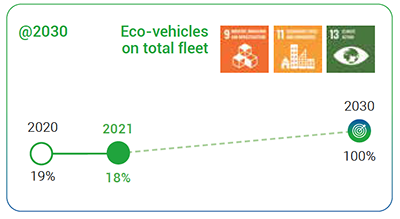The Group is committed to reducing atmospheric emissions from road traffic through the progressive electrification of its fleet, the systematic renewal of vehicles and the promotion of initiatives for employees.

| Atmospheric emissions of company vehicles (t) | |||
|---|---|---|---|
| Types of emissions (t)1 | 2021 | 2020 | 2019 |
|
NOX |
53 |
55 |
92 |
|
COV |
2 |
3 |
5 |
|
CO |
20 |
25 |
33 |
|
PM10 |
4 |
4 |
5 |
|
CO22 |
19,978 |
10,900 |
11,759 |
1 The emissions are calculated multiplying the km travelled by the vehicles (broken down into different Euro categories, type of fuel and vehicle) by the more recent emission coefficients (Source: INEMAR - ARPA Lombardia 2018). The mileage is obtained from the Group’s management software and through data from fuel companies on which merit checks are carried out.
2 The data for 2020 has been restated.
The management of the vehicles is carried out in compliance with the company guidelines that define safety levels, maximum distances and replacement criteria in relation to the overall distances, the age and wear of the vehicle and the variation in operational needs. Obsolete vehicles are replaced with electric or Euro 6 category vehicles.
The Business Plan confirms the drive towards sustainable mobility and the desire to make 100% of the company fleet eco-friendly by 2030. The goal can be achieved mainly thanks to the IrenGo project, which involves purchasing full-electric vehicles – cars, vans, vehicles for sorted waste collection and heavy vehicles – and the installation of recharging infrastructures (recharging units and wall boxes) at the Company’s premises.
At the end of 2021, about 830 electric vehicles were already on the road (cars, vans and waste collection quadricycles) and there were about 880 operational recharging points. These are vehicles that contribute to the improvement of air quality in the urban contexts in which they operate on a daily basis. In 2021, the IrenGo project made it possible to avoid the emission of approximately 1,400 tons of CO2eq and to save over 300 TOE.

Progress towards the 2030 target was influenced by an increase in the number of vehicles in the Group’s fleet, due to the entry of new companies acquired during the year, and the replacement of obsolete ecological vehicles, dedicated to sorted waste collection, with new electric vehicles.
The Group also promotes initiatives to encourage employees to use public transport (purchase of season tickets at a discounted price, in instalments or charged to their salary) and alternative methods of transport to reach the workplace, such as the “Ecoviaggio Smart” app, which offers the possibility of organising car-sharing journeys for work.
Working from home in 2021 had a positive environmental impact: about 1,800 t CO2eq avoided and 820 TOE saved
In addition, the Group has been implementing remote working methods (teleworking and smart working) for several years now, involving over 3,500 employees in 2021. This has generated a positive environmental impact: thanks to the reduction in travel, estimated at almost 12 million km, approximately 1,800 tons of CO2eq have been avoided and approximately 820 TOE saved.